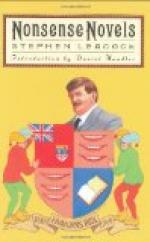The days passed.
Each day the beautiful Highland girl saw the young Laird, though her father knew it not.
In the mornings she would see him as he came fishing to the burn. At times he wore his fishing-suit, at other times he had on a knickerbocker suit of shepherd’s plaid with a domino pattern neglige shirt. For his sake the beautiful Highland girl made herself more beautiful still. Each morning she would twine a Scotch thistle in her hair, and pin a spray of burdock at her heart.
And at times he spoke to her. How Hannah treasured his words. Once, catching sight of her father in the distance, he had asked her who was the old sardine in the petticoats, and the girl had answered gladly that it was her father, for, as a fisherman’s daughter, she was proud to have her father mistaken for a sardine.
At another time he had asked her if she was handy about the work of the house. How Hannah’s heart had beat at the question. She made up her mind to spin him a pair of breeches like the ones now finishing for her brother Jamie.
And every evening as the sun set Hannah would watch in secret from the window of the cottage waiting for the young Laird to come past in his motor-car, down the Glen road to the sea. Always he would slacken the car at the sharp turn at the top of the cliff. For six generations no McWhinus had passed that spot after nightfall with his life. But Ian McWhinus knew nothing of the feud.
At times Oyster McOyster would see him pass, and standing at the roadside would call down Gaelic curses on his head.
Once, when her father was from home, Hannah had stood on the roadside, and Ian had stopped the machine and had taken her with him in the car for a ride. Hannah, her heart beating with delight, had listened to him as he explained how the car was worked. Had her father know that she had sat thus beside a McWhinus, he would have slain her where she sat.
The tragedy of Hannah’s love ran swiftly to its close.
Each day she met the young Laird at the burn.
Each day she gave him the finest of her lobsters. She wore a new thistle every day.
And every night, in secret as her mother slept, she span a new concentric section of his breeches.
And the young Laird, when he went home, said to the talcum blonde, that the Highland fisher-girl was not half such a damn fool as she seemed.
Then came the fateful afternoon.
He stood beside her at the burn.
“Hannah,” he said, as he bent towards her, “I want to take you to America.”
Hannah had fallen fainting in his arms.
Ian propped her against a tree, and went home.
An hour later, when Hannah entered her home, her father was standing behind the fireplace. He was staring fixedly into the fire, with the flint-lock musket in his hands. There was the old dour look of the feud upon his face, and there were muttered curses on his lips. His wife Ellen clung to his arm and vainly sought to quiet him.




